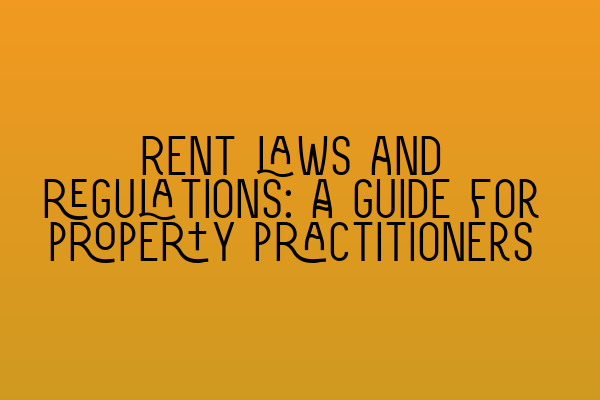Rent laws and regulations: A guide for property practitioners
Introduction:
As property practitioners, it is essential to have a comprehensive understanding of the various rent laws and regulations that govern the rental market. Rent is a fundamental aspect of property ownership and management, and staying up-to-date with the legal framework is crucial to ensure compliance and protect the interests of landlords and tenants alike.
In this comprehensive guide, we will cover the key rent laws and regulations that property practitioners should be familiar with. From tenancy agreements to rent increases, we will explore various aspects of rent laws and provide valuable insights to navigate this complex area of property law.
1. Tenancy Agreements:
Tenancy agreements form the foundation of the landlord-tenant relationship. They outline the terms and conditions of the tenancy, including the rent amount, the duration of the tenancy, and the responsibilities of both parties. It is essential to ensure that tenancy agreements are properly drafted, as a poorly written agreement can lead to disputes and legal complications.
Understanding the different types of tenancy agreements, such as assured shorthold tenancies (ASTs) and periodic tenancies, is crucial. For further guidance on drafting tenancy agreements, check out our related article: SQE 1 Practice Exam Questions.
2. Rent Increases:
Rent increases are subject to specific laws and regulations to protect tenants from unfair or excessive hikes. As a property practitioner, it is essential to understand the procedures and limitations involved in raising the rent.
In most cases, landlords can only increase the rent at specific intervals and within allowable limits. Familiarize yourself with relevant legislation to ensure a fair and legal rent increase. Our related article, SQE 1 Practice Mocks FLK1 FLK2, provides valuable insights into rent increase regulations.
3. Rent Arrears and Evictions:
Dealing with rent arrears and potential evictions can be a challenging and delicate process. Property practitioners play a crucial role in ensuring that legal procedures are followed when addressing unpaid rent and evictions.
Understanding the legal steps involved in recovering rent arrears and the eviction process is essential to protect the landlord’s interests while ensuring fairness for tenants. Stay informed about your responsibilities as a property practitioner, and consult our related article, SQE 2 Preparation Courses, for expert guidance.
4. Deposits and Deposit Protection:
Deposits are a significant aspect of the tenancy agreement, providing security for landlords against potential damages or unpaid rent. However, specific regulations govern the handling and protection of tenant deposits.
Ensure that you are familiar with the requirements for registering deposits with a government-approved scheme and providing tenants with the necessary information. This will help avoid legal disputes regarding the return of deposits at the end of the tenancy. For comprehensive guidance on deposit protection, refer to our related article, SQE 1 Preparation Courses.
5. Privacy and Repairs:
Tenants have a right to privacy and the enjoyment of their rented property, while landlords have an obligation to maintain the premises in a habitable condition. Property practitioners must be well-versed in the laws and regulations regarding tenant privacy and repairs.
Understanding the requirements for giving notice before entering a rented property and promptly addressing repair issues is essential. Failure to comply with the law can lead to complaints and potential legal action. Stay informed about tenant rights and landlord responsibilities by referring to our related article, SRA SQE Exam Dates.
Conclusion:
Rent laws and regulations are a vital aspect of property law that property practitioners must navigate with care. By understanding the legal framework surrounding tenancy agreements, rent increases, evictions, deposit protection, privacy, and repairs, practitioners can ensure compliance and protect the interests of all parties involved.
For further resources and expert guidance on various aspects of property law, including rent laws and regulations, consider our SQE preparation courses. Our experienced team of solicitors and experts at SQE Property Law & Land Law is here to provide the support you need to excel in your profession.
Remember, staying informed and up-to-date with rent laws and regulations will not only enhance your professional abilities but also contribute to a fair and thriving rental market.
Disclaimer: This blog post is for informational purposes only and should not be construed as legal advice. Always consult a qualified solicitor for specific legal guidance tailored to your situation.
